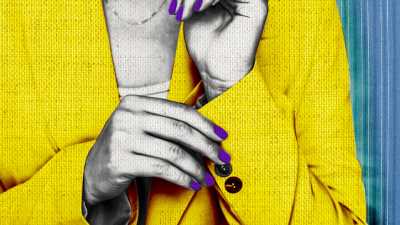
Save articles for later
Add articles to your saved list and come back to them any time.
The former New York Times fashion photographer Bill Cunningham once said that fashion was “armour to survive the reality of everyday life”.
Domestic violence worker Kate Jackson took the late Cunningham’s mantra one step further when she created Haus of Armour, a fashion styling service for victim-survivors, who often need to suit up for battle – quite literally – to face their perpetrators during legal or custody proceedings.
In difficult situations, fashion can become armour. Credit: Monique Westermann/iStock
“I am trying to use clothes and fashion as a means to rebuild [their lives], so they feel valued and seen,” she says. “This is a form of healing that impacts their mental health and wellbeing,” she says. “Talking therapy isn’t always the only form of recovery.”
Jackson provides her service to women located in and around the Northern Rivers region of NSW who have left abusive relationships and are trying to re-establish their independence. Her corporate partners, including clothing chain Dissh and Thread Together, donate excess and past-season stock from Australian brands, which Jackson styles into three outfits for each client who comes to her Mullumbimby studio (for now, Haus of Armour is unable to accept clothing donations from individuals).
Often, Jackson has to find women a suitable outfit to wear to court, a task that she also uses to smash stereotypes about what such clothing “should” look like. She points to a pair of bright red Camilla and Marc tuxedo trousers that she selected for one client, to make the point that power dressing doesn’t need to be bland. “Why do you have to look boring and conservative?” she asks. “[My client] felt powerful and the sense she [felt protected].”
Haus of Armour founder Kate Jackson.
One of Jackson’s clients, Melissa Maher, had been feeling apprehensive about going to court to face her attacker, until her session with Jackson. “Then I tried on some funky stuff and felt amazing,” she says.
Maher, who is 34, has two children and experienced homelessness after leaving her violent partner. She says there was no time for self-care – including buying herself clothes – when she was in the abusive relationship. Receiving styling advice and clothes from Jackson made her feel “elated”.
“Having the opportunity to have Kate look at my body type, and have someone give me a well-made piece of clothing … it feels good, it puts me in the place of being able to … feel worthy of goodness,” she says.
Jackson, a trained interior designer and stylist who switched careers to social work after a trip to Kenya about 10 years ago, hopes her unusual skill set leaves her well-placed to expand Haus of Armour across Australia. But to do so, she will need grant money, or a revenue stream for the not-for-profit, such as setting up a high-end op-shop.
She says it would help if more people – including government and other policy- and decision-makers – could see the important practical and therapeutic role clothing can play in the healing process for victim-survivors. “You see the difference in how they hold themselves in the mirror,” she says.
Fashion as armour: New York Times photographer the late Bill Cunningham.Credit: AP Photo
Jacquie O’Brien, director of community change at Respect Victoria, says a woman’s access to clothing and control over what she wears are often tied up in patterns of abuse.
“When you look at women who are leaving relationships, they may not have taken their clothes or wardrobes with them, or been able to wear what they want to in those violent and controlling situations,” she says. “It’s something that needs to be genuinely seen as part of the process of rebuilding a life after leaving a violent situation.”
Brisbane-based charity Beyond DV says 95 per cent of its clients say being told what they can and cannot wear was one of the features of their abusive relationship.
If you or anyone you know needs support, you can contact the National Sexual Assault, Domestic and Family Violence Counselling Service on 1800RESPECT (1800 737 732), Lifeline 131 114 or Beyond Blue 1300 224 636.
Make the most of your health, relationships, fitness and nutrition with our Live Well newsletter. Get it in your inbox every Monday.
Most Viewed in Lifestyle
From our partners
Source: Read Full Article


